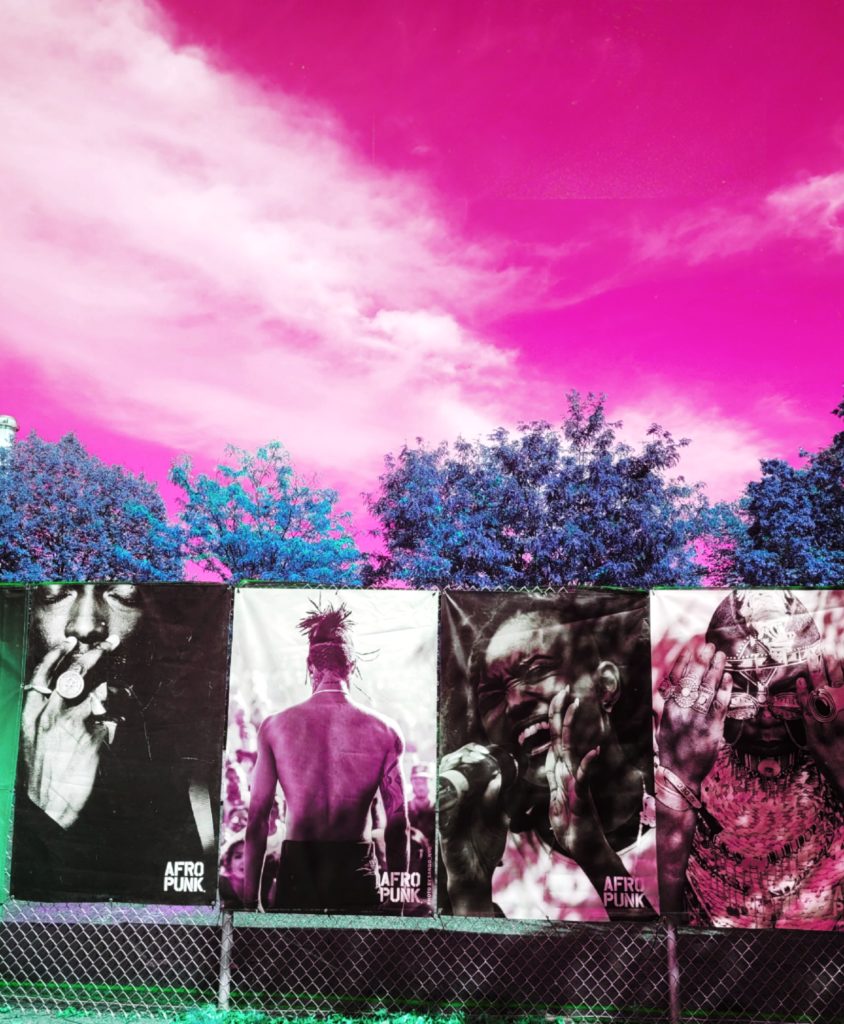
Festivals and events that center Black Punk artists and creatives are scarce, despite the fact that Black musicians have always been pioneers in the punk world. Earliest bands included groups like Pure Hell, Bad Brains, Death, and Fishbone–all too often left out of conversations regarding the Punk scene. Since its creation around the late 60’s/ early 70’s – punk was more than just a new genre of music. It was a way of life. The attitudes of anti-establishment was the pinnacle tenet- rejecting everything from mainstream culture, as well as systemic issues like white supremacy, capitalism, and the patriarchy. Black people thrive in this genre. We make our voices and experiences heard in this powerful space, and reinvent what punk means for future generations.
The 2003 documentary, Afro-Punk, explores the relationship of Black people in the punk scene throughout history. This was created by James Spooner, a film director and graphic novelist who went on to co-found the AfroPunk Festival. The event was created for Black people to celebrate our important role in the alternative movement and provide a safe space by us/for us-contrasting to other punk and rock festivals that exist. Every year, this event hosts festivals in major cities with a lineup of musicians, artists, creators, food venues, and activities. It has also been a time capsule of incredible AfroPunk looks in fashion – from outfits ranging from afro-futuristic to vogue-esque.
While some notable musicians from the alternative genre have performed at AfroPunk since its inception, one of the many criticisms is that the festival has left out the “Punk” essence in its event. In the most recent years, the festival primarily has a R&B and Hip Hop lineup, with little to no punk and alternative artists selected. The festival also used to be free to the community, but over the years has gone up in cost (now roughly $145 per day pass ticket). What once was a safe haven for Black alternative collectives, has now left several past attendees with the feeling that the festival is not as ingrained in what it once was. There have also been unfortunate reports from creators that accuse the AfroPunk of stealing content without credit, lack of accessibility (despite one of it’s banners being “No Ableism”), and removing attendees with clothing criticizing the event. Although the festival was created for the alternative Black community, there has been an influx of non-Black participants and influencers alike gaining sponsorship and access to festivals that often are sold out by the day of the event. These are just a few of the many criticisms that AfroPunk has faced, which has led to dissolution from the original community – including its founder.
The AfroPunk site itself remains a community that produces articles from everything about Black culture – including music, fashion, art, activism, and more. There is a wide interest in the music section that does have contributions about alternative artists, although it may not be the entire focus of the page.
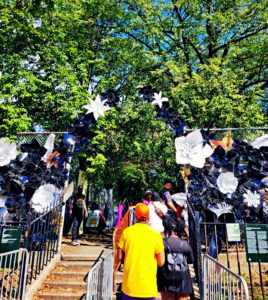
In 2022, I attended the AfroPunk Festival in Brooklyn. I had been following AfroPunk for about a year and wanted to understand a little more about the festival and what it was about. Having grown up in a small town, this was an incredible opportunity especially as someone who didn’t have alternative spaces that were catered primarily to Black and Brown people. Here are some of my takeaways from my first experience attending the festival.
BOOTHS/VENDORS
There were several booths set up by small Black businesses that sold things like handmade accessories, paintings, art pieces, and more. I found so many great things, I wish I could have purchased something from each booth. A lot of the products were out of my pocket range, but I took business cards and social media, which I definitely recommend doing. I purchased a really beautiful piece from Hyero the Crochet Painter and handmade jewelry from Elouinia Exantus.
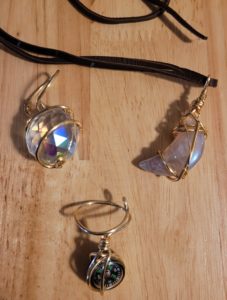
FASHION
There were so many unique and innovative outfits, you could tell that people put a lot of preparation into this event. People came decked out in body paint, beadery, Afrocentric designs, and high fashion. Hairstyles were truly incredible – everything from afro puffs to long intricate braids. I wanted to take more photos of people (I’m shy lol) but everyone appreciated compliments on their looks. I wish I would have gone all out because this is definitely the event to do so. You can tell it was a place that thrives on community and creativity. I will say, I think one of the cool things said about earlier AfroPunk festivals is that there wasn’t much of a fashion hierarchy- people came as they were as their original self, whether that be punk, goth, grunge or just a relaxed style. My experience felt like there weren’t too many alternative looks – and that it was more of a high afro fashion and expensive brand clothing type of vibe.
FOOD
There was a variety of food options- from soul food to Haitian cuisine. I knew from the sight of large aluminum trays that all the food was going to be incredible. There were also several booths that sold special cold beverages and drink varieties. The prices were decent, and we were able to get a good amount of food from the places we bought from.
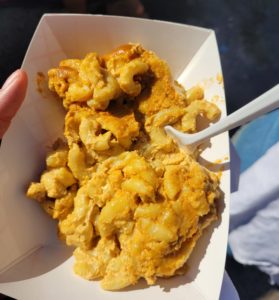
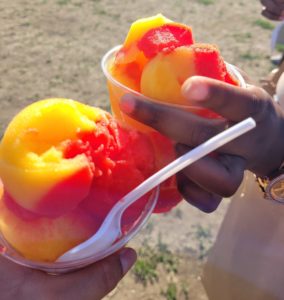
MUSIC
There were two stages on opposite sides of the stage of the park. Each stage had their own lineup and artists performed simultaneously. I didn’t feel like it interfered with each other, as the park was pretty big enough–we didn’t have to walk super far from the food/booths to the stages. The map on Instagram provided the event’s lineup as well. Performances that Sunday included Doechii, The Roots, Isaiah Rashad, BBY Mutha, Talia Goddess and more. I was really happy that I got to see Doechii, as I had discovered her music during the pandemic. She was incredible, and you can tell by the crown that everyone was having a great time.
TAKEAWAY
I think honestly I was so glad to just have this experience – being my first festival full of Black creators and artists – that I really forgot about the Punk element that I had been craving. I have spent over the last few years reconnecting with the alternative culture and the music that I fell in love with since my childhood and new artists I have since discovered. So much of what the Black alternative movement instills, didn’t feel like it was being executed here. While still an incredible festival full of Black joy and creative elements – very little about it made me believe that it was anything adjacent to an alternative festival. I would imagine that most festival goers from the beginning in 2013 would say that the current festival is almost unrecognizable. While a big part of it is the sponsorships and the ever-growing non-Black attendees- a lot of it is the feeling of a takeover from larger companies over small businesses. And ultimately–the topic of the music.
This is a difficult conversation altogether. I don’t see R&B & HipHop as the opposite of Punk – they are family. These are genres that were created by Black people as not only an outlet to express our emotions, but a call to action and a call for generational peace for us. Throughout history these genres have been pressed into stereotypes, often putting our community in boxes rather than the freeing space that it was intended for. So to have new and classic artists in the R&B and HipHop genre perform at these events in itself is an act of defiance – against any type of thought piece that believes that we aren’t allowed to do both. We can listen to rap but also be invested in alternative culture and whatever medium simultaneously. But the issue is not rooted in having Hip Hop/R&B artists at these festivals. The issue is that despite all of the incredible existing and new Black alternative musicians in the Punk, Metal, and Rock genre – this is not the festival that highlights them. This diminishes such a great opportunity for these artists, as well as for the Black alternative community to enjoy.
Even though I had a positive experience, I believe the recent criticisms must be considered for AfroPunk’s longevity. While there definitely is a community here – Black people come from all over the US to be a part of these events. But I do feel that AfroPunk may have to acknowledge how its original tenets have shrinked for a more mass level of success. It’s not just about having MORE punk and alternative artists perform. It’s the idea that for all that punk stands for- the rebellion from the system–is not highlighted here. With the rising costs of participation, and more and more mainstream artists being able to take the main stages – AfroPunk has become ultimately more inaccessible and less authentic. I do still believe that Black people are able to enjoy the festival, and even the offerings on the website. But my concern is rooted in the fact that in a few years time, it’s possible that this will be an event that will be primarily for influencers and the rich alike, and lose all interest in keeping any remains of its original sentiment intact.
Ultimately, this remains a prevalent topic in our community. Oftentimes we and our brands are faced with having to choose between what is going to sell to a wider audience and make more of a profit, rather than what is substantially more accessible to especially lower class individuals. While AfroPunk may still be an incredible festival that offers memorable experiences to attendees, it has traded off its unique roots for something more easily commodified. The Black alternative community is forced to adjust (as it always has) and continues to create spaces that ALL Black alternatives can enjoy, not just those who can afford a festival ticket or a high priced outfit. Hopefully with more Black representation in the media, people will begin to understand why our roots in this genre and lifestyle are so vital to the resistance of the establishment. And my hope is that we inspire the next generation to see value in being consistent in creating those spaces for Black alternatives.
